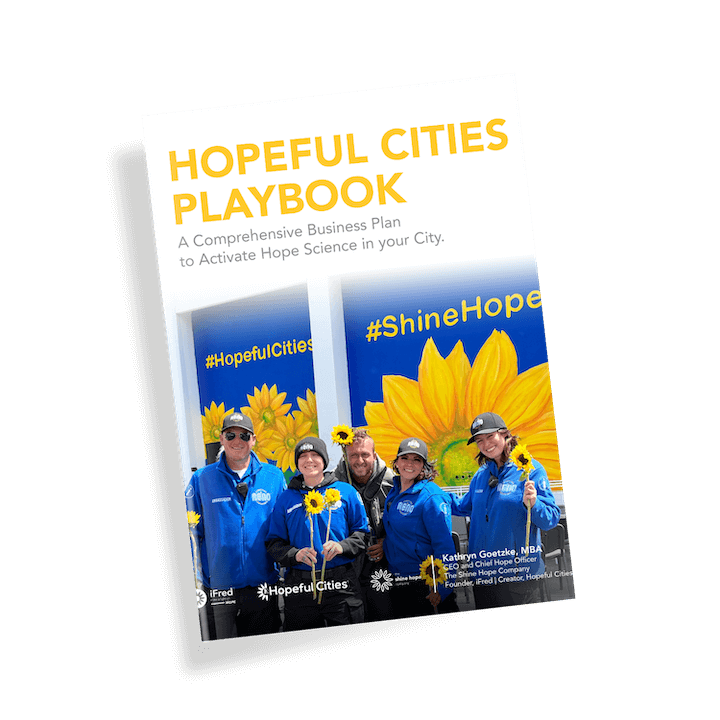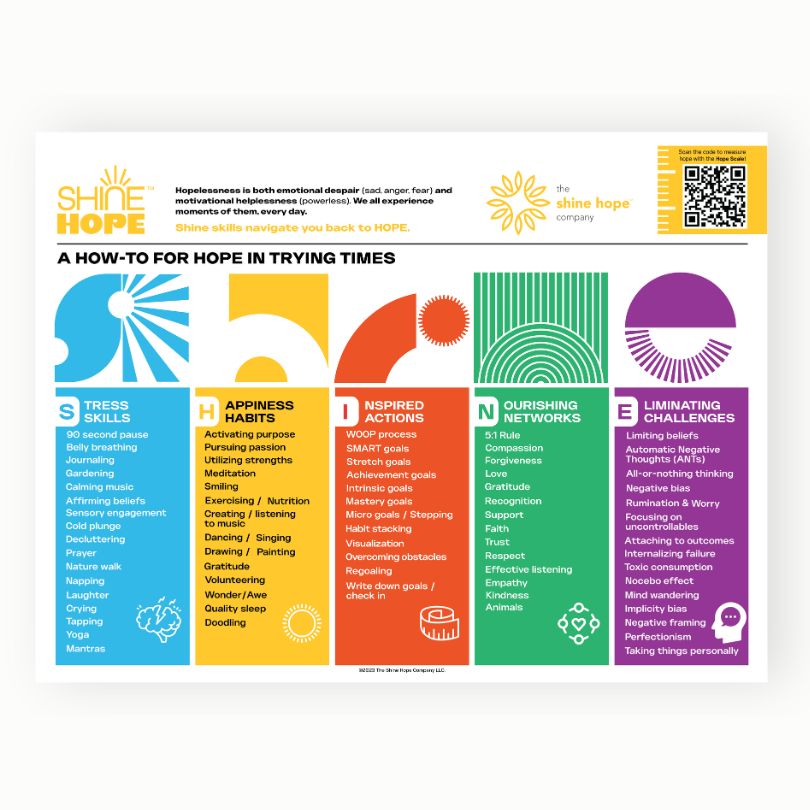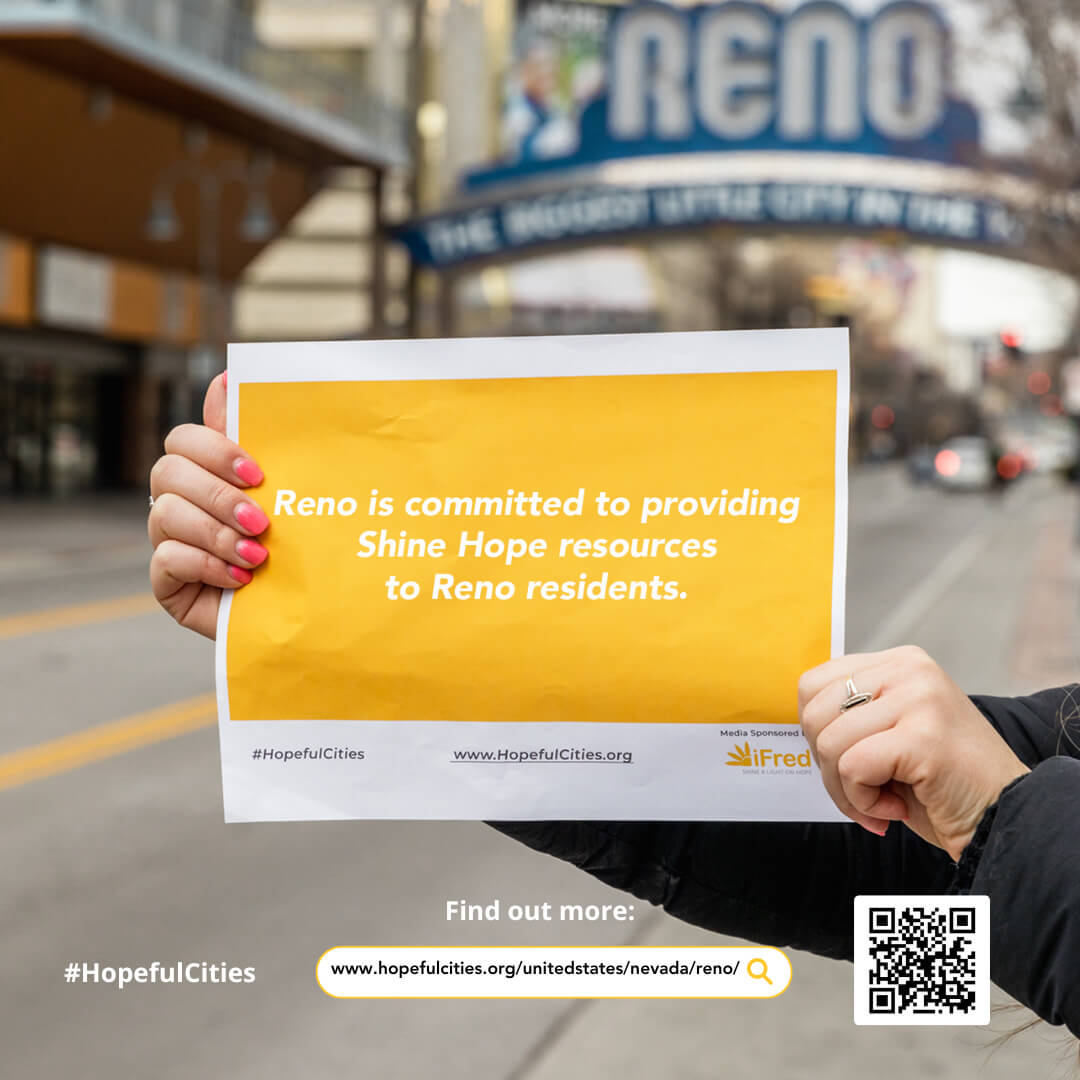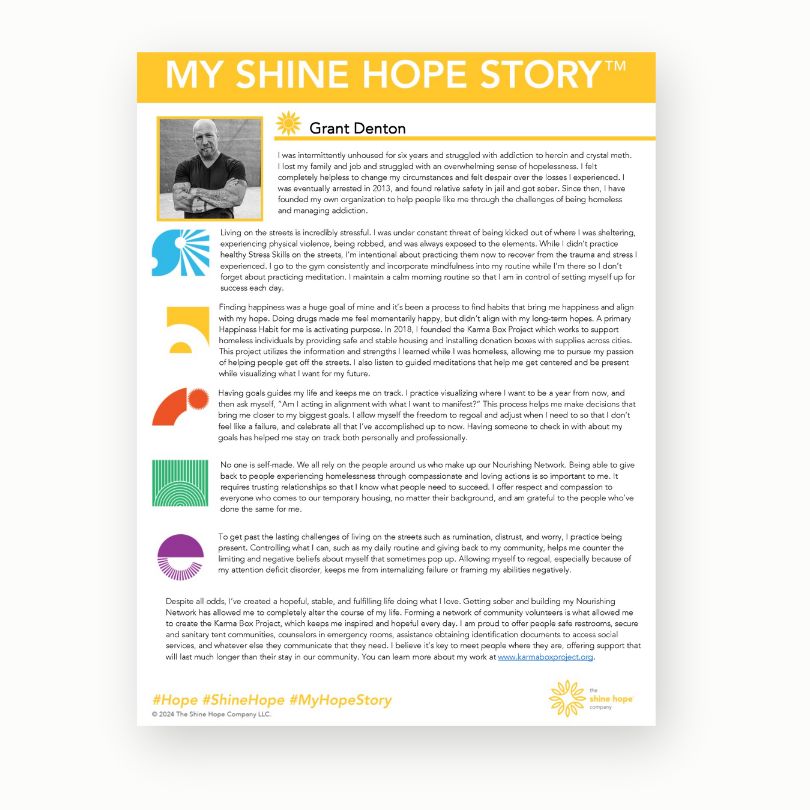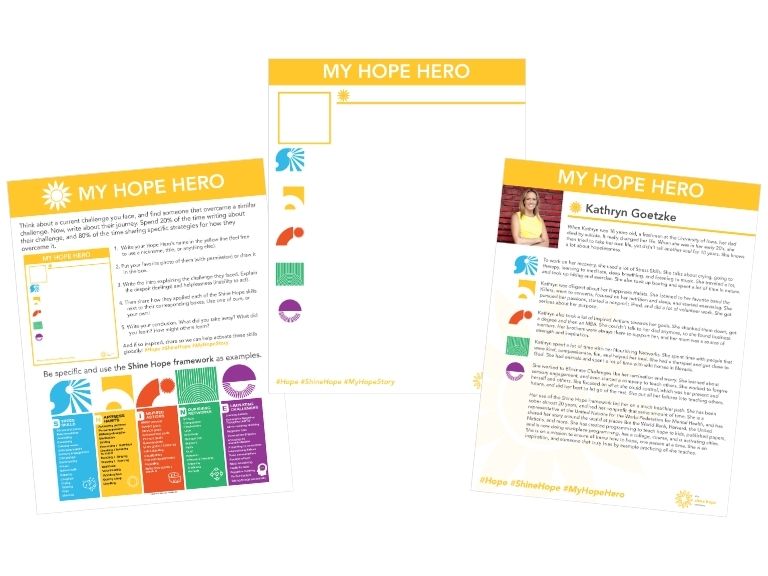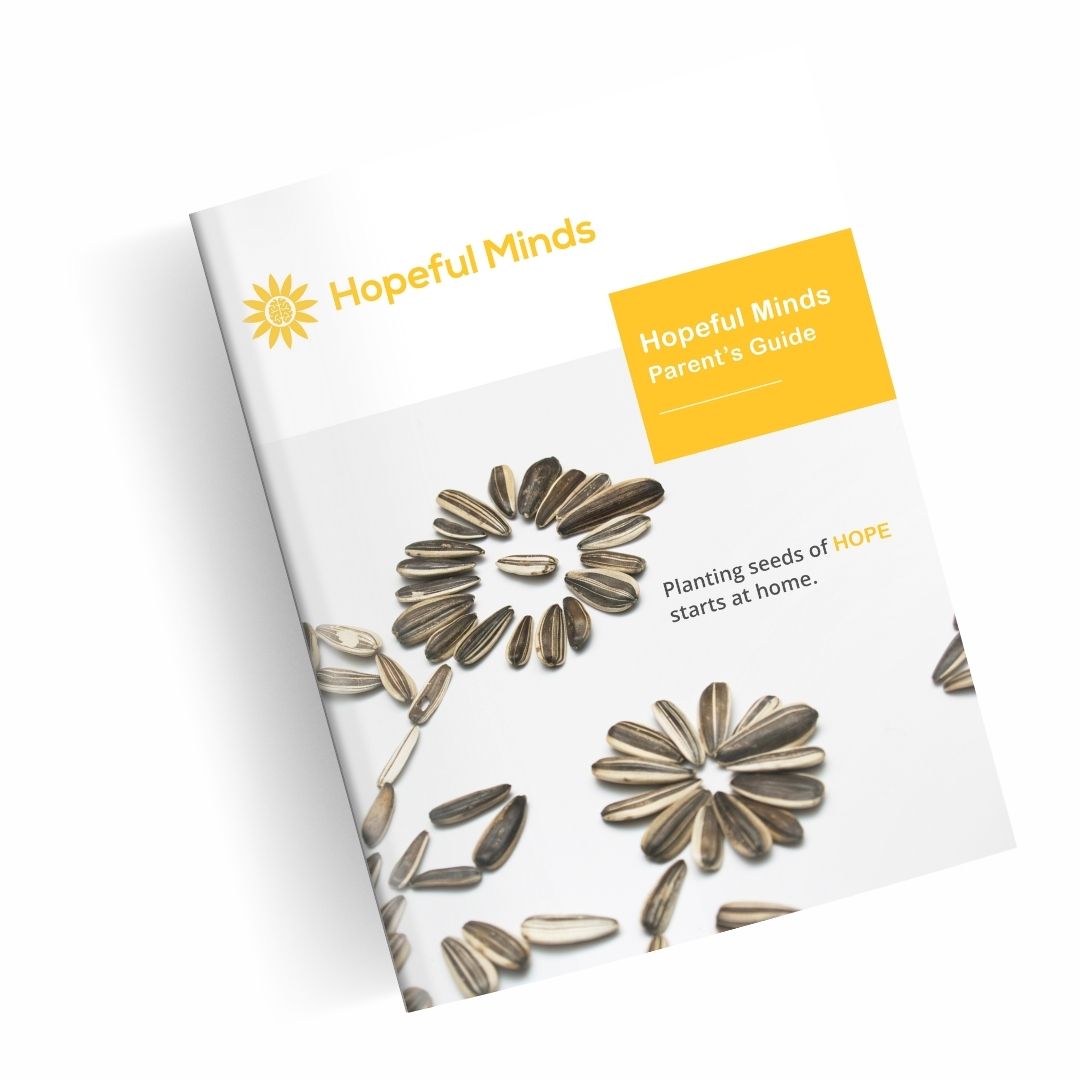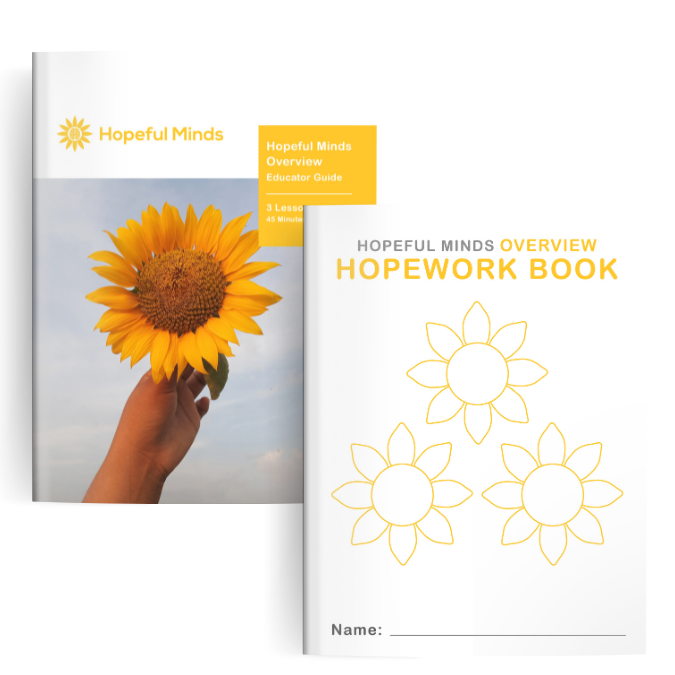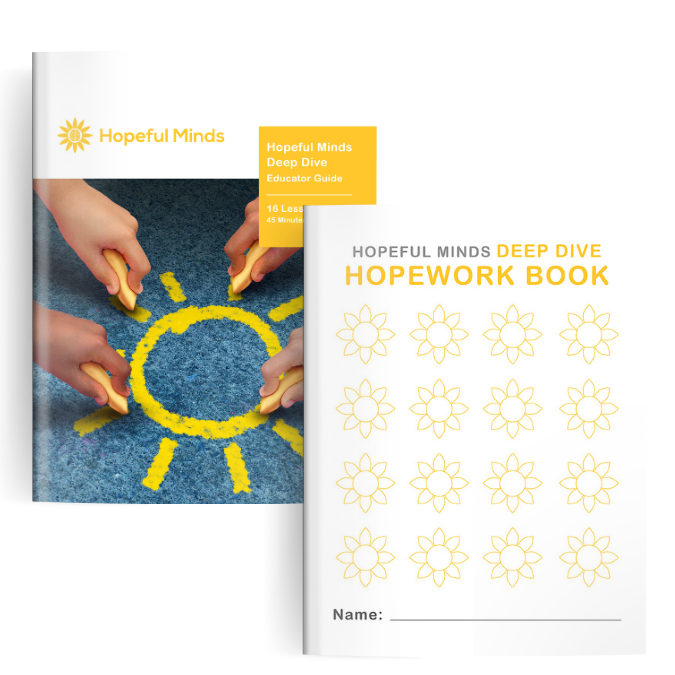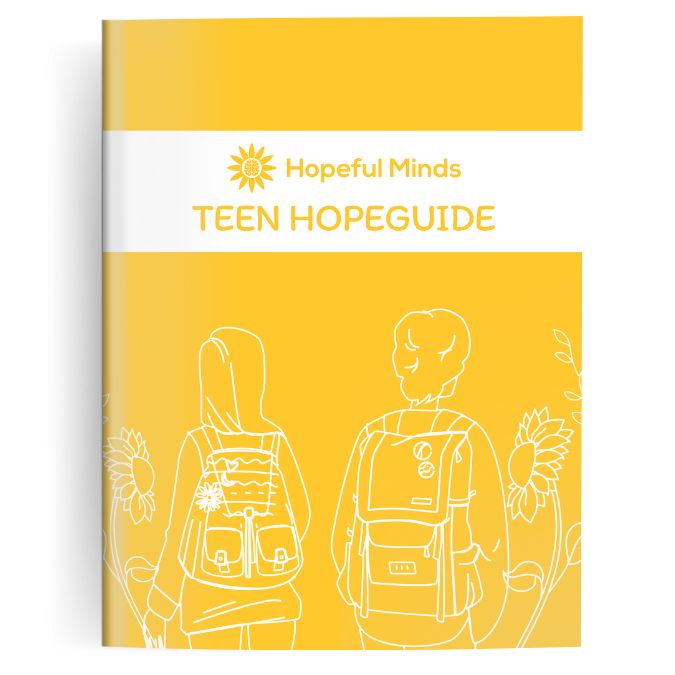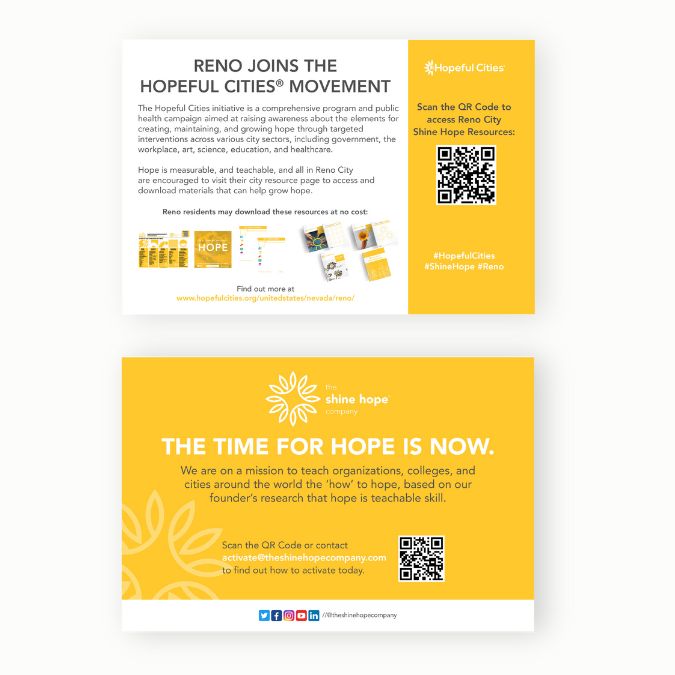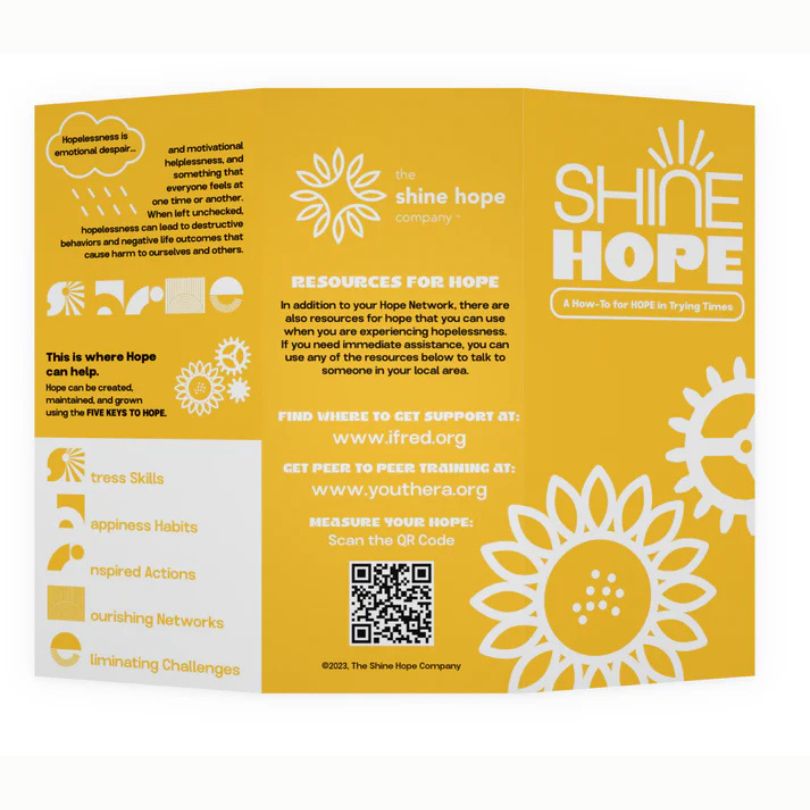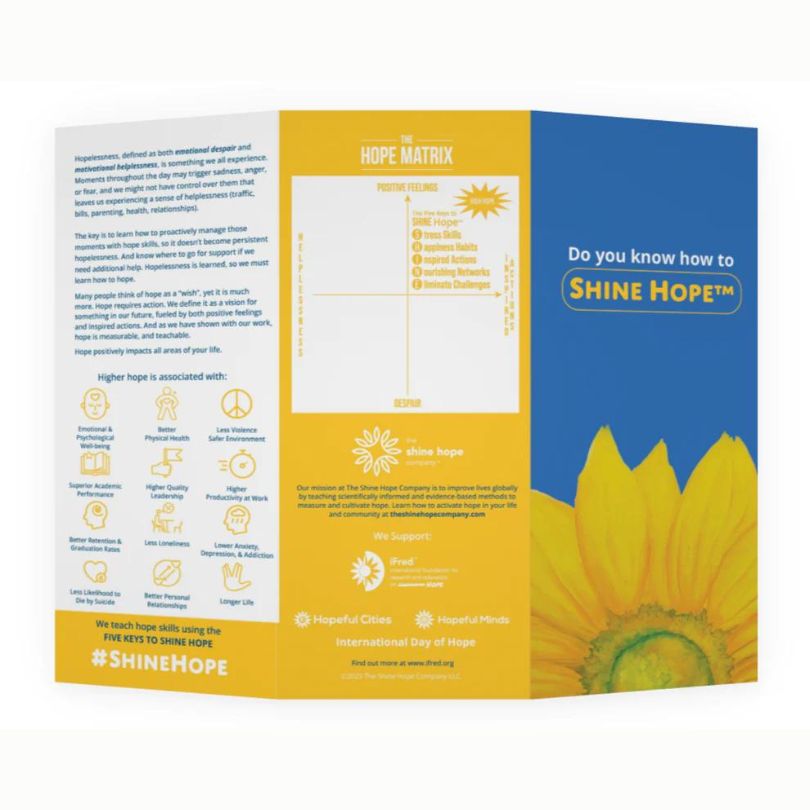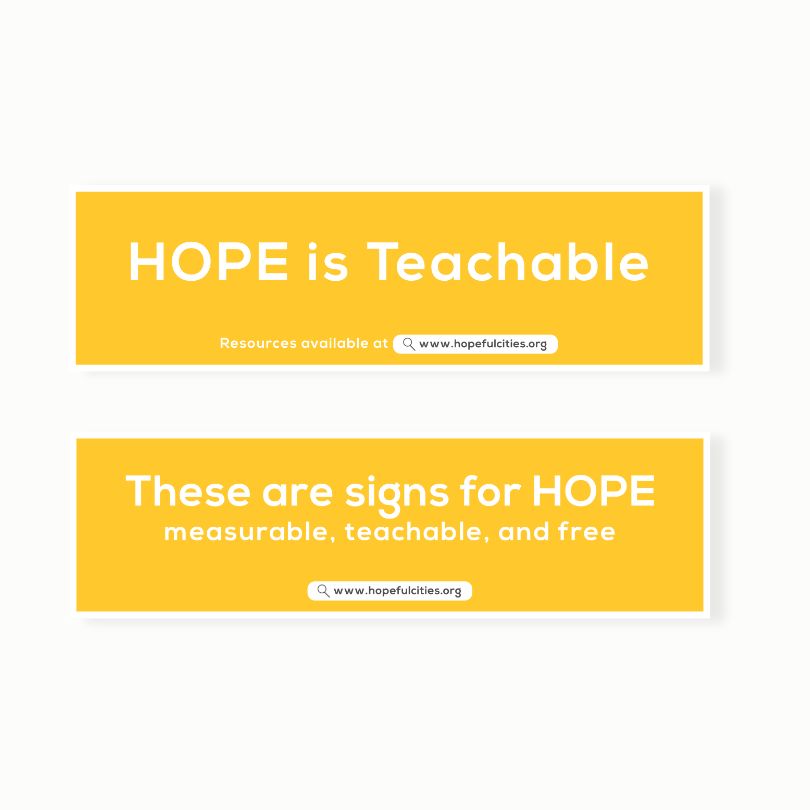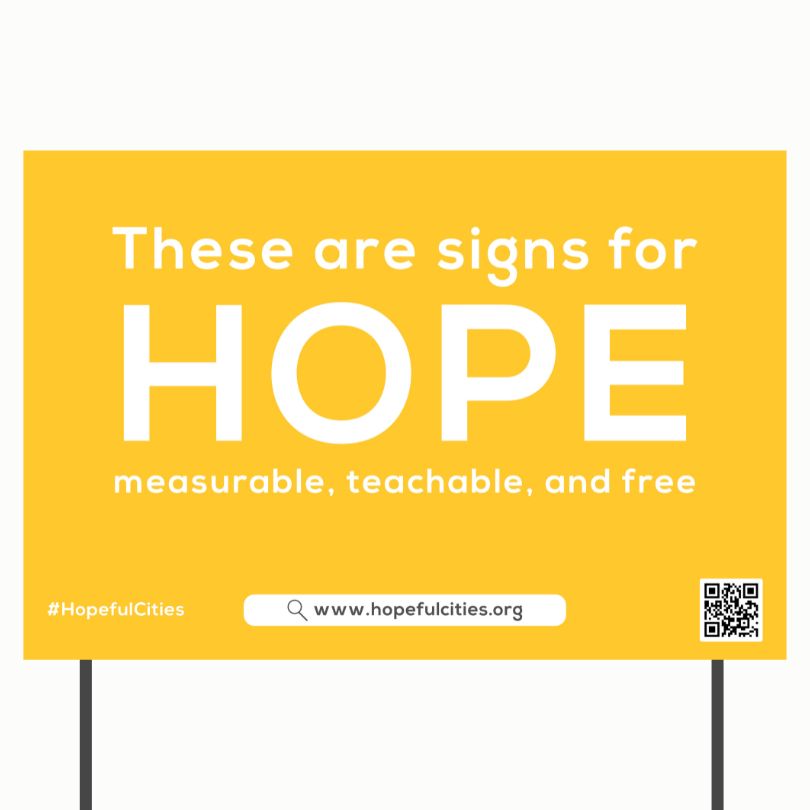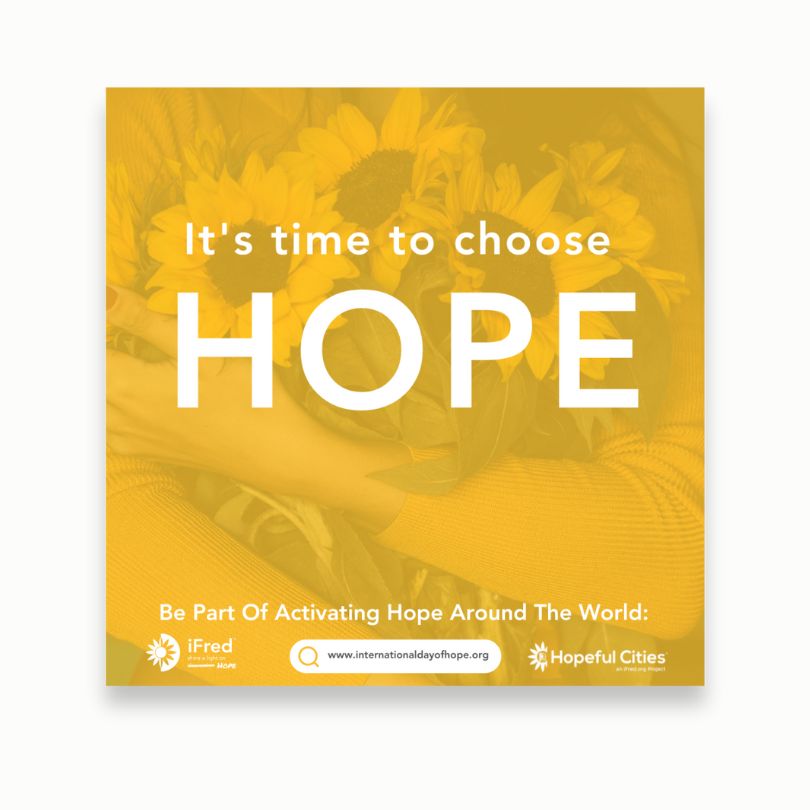Reno
RENO JOINS THE HOPEFUL CITIES MOVEMENT
If you or someone you know are having challenges with Hope or needs immediate help, call 988. You can also text HOME to 741741 to connect with a counselor from crisistextline.org. You can find a list of international resources here.
Programs to Activate Hope in Reno
Hopeful Cities Playbook
The Hopeful Cities® Playbook is a resource designed to make Hope accessible and operational in any city around the world. It is a marketing plan in action that operationalizes Hope as it creates awareness about the Science of Hope. It is a step-by-step guide to help cities activate the “how-to” of Hope throughout the community.
Shine Hope Infographic
Elevate your knowledge of Hope with our Shine Hope Infographic. Hang it on the walls of your workplaces, coffee shops, libraries, waiting rooms or give it to a friend.
Global Hope Challenge Social Media Kit
The Five-Day Global Hope Challenge is a five-day challenge ensuring all know the what, why, and how to Hope. It reviews what Hopelessness is, the Shine Hope framework, and instructs how to measure Hope. It is a simple way to get started learning how to Shine Hope.
Social media is a great way to share the resources available for Hope with your friends, family, and community, so we have created a social media toolkit for Hope as well. All of our images and content are available to download at no cost to share and activate the message for Hope.
My Shine Hope Story™ Template
My Shine Hope Story gives community leaders an avenue to normalize Hopelessness and share their unique experiences by using the Shine Hope framework. We all experience moments of Hopelessness (i.e., emotional despair and motivational helplessness). How we manage the moments of Hopelessness matters.
My Hope Hero Template
Hopeful Minds Parent's Guide
The Hopeful Minds® Parent’s Guide provides a broad overview of the concepts discussed in the Hopeful Minds curriculums, and provides parents with easy ways to implement the Five Keys to Shine Hope (Stress Skills, Happy Habits, Inspired Actions, Nourishing Networks, and Eliminating Challenges) and Hopeful language in the home.
Hopeful Minds Overview Educator Guide and Workbook
The Hopeful Minds® Overview Educator Guide is a curriculum designed to give children an introduction to the “what,” “why,” and “how” of Hope. The curriculum includes three, 45-minute lessons that introduce the key tools needed to create, maintain, and grow Hope, background information for educators, supplemental resources, classroom visuals, and a Hopework Book for students.
Hopeful Minds Deep Dive Educator Guide and Workbook
The Hopeful Minds® Deep Dive Educator Guide is a scripted curriculum designed for educators (or anyone working with children) to give children a deeper understanding of the core components of Hope. The curriculum includes 16, 45-minute lessons that explore the tools needed to create, maintain, and grow Hope, background information for educators, supplemental resources, classroom visuals, and a Hopework Book for students.
Hopeful Minds Teen Hopeguide
Tested and approved by teens, the ‘Hopeful Minds® Teen Hopeguide is a 12-module workbook that introduces the Five Keys to Shine Hope™: Stress Skills, Happiness Habits, Inspired Actions, Nourishing Networks, and Eliminating Challenges. This comprehensive approach empowers teens to navigate challenges, embrace positivity, and empower resilience.
Postcards
These postcards are designed to connect city residents with valuable, no-cost resources to help them learn how to Hope. This make it easy for individuals to access their city’s Shine Hope resources by simply scanning the included QR code or following the provided link. These postcards are perfect for distributing at community events, schools, local businesses, or any gathering where spreading Hope can make a difference.
Moment of Hope Cards
These pocket-sized educational cards feature inspiring Hope *quotes on one side and tips on how to Shine Hope on the other. Give to friends, family members, at work, and in the community.
Teen Shine Hope Brochure
Elevate your knowledge of Hope with our Teen Shine Hope Brochure. Display it in your waiting room, distribute it at work, give it to teen students, put it in a library, or give it to a friend. Included are tips on the Shine Hope framework, and resources that are available to elevate in your life and with others.
Shine Hope General Brochure
Elevate your knowledge of Hope with our digital Shine Hope Brochure. Display it in your waiting room, distribute it at work, give it to students, put it in a library, or give it to a friend. Included are tips on the Shine Hope framework, and resources that are available to elevate in your life and with others.
Posters
Elevate your knowledge of Hope with our Shine Hope posters. Hang it on the walls of your workplaces, coffee shops, libraries, waiting rooms or give it to a friend.
Billboards
A great way to share the initial message that “Hope is Teachable” to a wide audience is through billboards. Billboards are effective for getting messages to broad populations, as they are free to view unlike newspapers and magazines. Billboards allow you to reach more people faster and cheaper than many other mass marketing media, and are effective for branding campaigns.
Yard Signs
Yard Signs are a simple and cost-effective way to spread the “how-to” of Hope in the community. They are easy to print, as most local printers do so already for political campaigns. They spread awareness, are affordable, and are a great way to activate Hope in your community by promoting the Hopeful Cities program.
Social Media Kit
Social media is a great way to share the resources available for Hope with your friends, family, and community.
*By downloading these resources, you agree to our policy and you acknowledge that you live in Reno, Nevada. Please refer to the other city pages if you are not from this city or visit this page to download the materials as a general user.
Disclaimer: These materials are designed to assist you in learning about Hope. They should not be used for medical advice, counseling, or other health-related services. iFred, The Shine Hope Company and Kathryn Goetzke do not endorse or provide any medical advice, diagnosis, or treatment. The information provided herein should not be used for the diagnosis or treatment of any medical condition and cannot be substituted for the advice of physicians, licensed professionals, or therapists who are familiar with your specific situation. Consult a licensed medical professional, or call 911, if you are in need of immediate assistance.
2024 Southern Nevada Mental Health and Social Services Resource Guide
- Support Groups
- Mental Health Learning Resources
- Non Emergency Numbers
- Homelessness
- Division of Public and Behavioral Health
Support Groups
The road to recovery can be difficult, but there are lots of community resources to support you on your journey.
Click on the links below to learn more about various support groups located in the Reno area.
- NAMI Northern Nevada
- Alcoholics Anonymous
- iFred Online Anxiety and Depression Community
- Al-Anon Family Groups, “a fellowship of relatives and friends of alcoholics who share their experience, strength, and Hope.”
- Narcotics Anonymous, Sierra Sage Region
- The National Alliance on Mental Illness Northern Nevada Chapter offers a number of free support groups for individuals with mental illness as well as family support groups.
- Download Reno Resource List
Mental Health Learning Resources
Listed below are a number of community resources for mental health patients and their families that can prove insightful.
- Join Together Northern Nevada: “Whether you’re looking for help with substance addiction, searching for community data or just want to know more information about the substance abuse in our community, JTNN is here for you.”
- Mental Health America
- Nevada 211 connecting “individuals, families, and providers to essential health and human services information and resources.”
- Substance Use and Mental Health Services Administration
Non Emergency Numbers
Mental Health Support
New U.S. Suicide Hotline: 988
Free and complimentary assessments available 24/7: 775-393-2200
The National Alliance on Mental Illness Downloadable Guide to Navigating a Mental Health Crisis
The Jason Foundation: A Friend Asks app – information, tools, and resources for your smartphone
Text “Jason” to 741741 to speak to a trained Crisis Counselor through The Jason Foundation and Crisis Text Line
Non-emergency numbers and contacts:
Center for Disease Control and Preventions: cdc.gov
Washoe County, City of Reno & City of Sparks COVID-19 Website:
covid19washoe.com
LAW ENFORCEMENT
Washoe County Sheriff 775.785.9276
Reno Police 775.334.2175
Sparks Police 775.353.2385
UNR Police 775.334.2677
Washoe School Police 775.348.0285
FIRE
Truckee Meadows Fire 775.326.6000
Reno Fire Dept. 775.334.2300
Sparks Fire Dept. 775.353.2255
MEDICAL
- NV Medical Center 775.331.7000
Renown Medical Center 775.982.8100
St. Marys Medical Center 775.770.6940
REMSA 775.858.5700
MISCELLANEOUS
Animal Control 775.322.3647
BLM 775.359.1246
NV Energy NON Emergency 775.834.4444
NV Energy Emergency 775.834.4100
NV Energy Management 775.687.0300
Reno Direct 775-334-INFO (4636)
Secret Witness 775-322-4900
UP RMCC 888.877.7267
Washoe Animal Control 775.353.8900
Washoe Emergency Mgmt. 775.337.5898
Homelessness
Community Assistance Center (CAC)
The Community Assistance Center (CAC) provides emergency shelter for men, women, and families and other services and programs to those experiencing homelessness. Volunteers of America currently operates the CAC.
The Community Assistance Center is located at 335 Record Street
Emergency Shelter
- Up to 21 homeless families and 6 pregnant women or women with an infant can be sheltered at the family shelter.
- Call: 775-322-9574
- Approximately 158 adult men can be sheltered nightly in the men’s shelter. An additional 66 individuals can utilize the day room during inclement weather.
- Call: 775-329-4141
- Approximately 50 adult women can be sheltered in the women’s shelter.
- Call: 775-329-4145
Tom Vetica Resource Center
The Tom Vetica Resource Center provides free services to individuals experiencing homelessness, including:
- Telephone use with free long distance
- Voicemail service
- Receiving mail
- Fax and copies
Other programs and services are also regularly available at the resource center, including:
Call: 775-657-4675
ReStart Program
ReStart is a Volunteers of America program offering resources and referrals for eligible individuals and families who are homeless or at risk of homelessness and have a mental illness. Services include:
- Psychiatric services
- Medication management
- Case management
- Substance abuse counseling
Call: 775-324-2622
Deposit Assistance Program
The Deposit Assistance Program provides security deposits and utility deposits to the following individuals:
- Homeless clients who live at the CAC and who have gained employment or other income;
- Individuals who currently have Section 8 vouchers;
- Transitional living clients who have graduated (they must present their certificate to staff) and are ready to move into a unit; or
- Individuals who present severe circumstances with proof of income.
Call: 775-334-2218
Other Assistance and Services
In addition to the assistance and programs at the CAC, the City partners with many other organizations to provide other services.
- Health Care
- Youth Services
- Domestic Violence
- Good Shepherd’s Clothes Closet
- Catholic Charities of Northern Nevada
- Reno-Sparks Gospel Mission
- Washoe County Human Services Agency
- Reno Area Alliance for the Homeless
For general homeless and social services information please contact Nevada 211 by dialing 2-1-1 on your phone.
Community Homelessness Advisory Board
The Community Homelessness Advisory Board is comprised of elected representatives from the City of Reno, City of Sparks, and Washoe County. The board is tasked with providing input and making recommendations on homeless issues in the region. Meetings are open to the public.
Still have questions? Email homeless@reno.gov.
Division of Public and Behavioral Health
Community Resources
The Division of Public and Behavioral Health establishes and develops relationships with community partners, including collaborating on resources that will improve public health and behavioral outcomes for all communities within Nevada. Below is a list of community resources for your convenience.
- Adolescent Health – Personal Responsibility Education Program (PREP)
- Adult Viral Hepatitis Prevention and Control (HEP)
- Child and Youth with Special Health Care Needs (CYSHCN)
- Colorectal Cancer
- Comprehensive Cancer
- Cosmetic Manufacturing
- Diabetes
- Drug Manufacturing
- Early Hearing Detection & intervention (EHDI)
- Emergency Medical Systems (EMS) – Agency Service Directory
- Epidemiology and Laboratory Capacity (ELC)
- Food Establishments
- Healthcare Associated Infection Prevention and Control (HAI)
- Heart and Stroke Prevention and Control
- HIV Prevention
- HIV Surveillance Program (HIV-OPHIE)
- Individual Sewage Disposal System
- Mammography
- Nevada Birth Outcomes Monitoring System (NBOMS)
- Nevada Breastfeeds
- Nevada Central Cancer Registry (NCCR)
- Nevada WebIZ
- Public Accommodations (Hotels and Motels)
- Public Bathing Places (Pools & Spas)
- Public Health Preparedness (PHP)
- Radiation-Incidents
- Radiation Producing Machines (RPM)
- Radioactive Material Program (RAM)
- Radon
- Rape Prevention and Education (RPE)
- Ryan White Part B
- School Health
- Shellfish Distribution Program
- Tuberculosis (TB)
- Tobacco Prevention and Control
- Vaccine Preventable Diseases
- Vaccines for Children (VFC) Program
- Women’s Health Connection (WHC)
- Worksite Wellness
- Youth Risk Behavioral Surveillance System (YRBSS)
- Support Groups
- Mental Health Learning Resources
- Non Emergency Numbers
- Homelessness
- Division of Public and Behavioral Health
Support Groups
The road to recovery can be difficult, but there are lots of community resources to support you on your journey.
Click on the links below to learn more about various support groups located in the Reno area.
- NAMI Northern Nevada
- Alcoholics Anonymous
- iFred Online Anxiety and Depression Community
- Al-Anon Family Groups, “a fellowship of relatives and friends of alcoholics who share their experience, strength, and Hope.”
- Narcotics Anonymous, Sierra Sage Region
- The National Alliance on Mental Illness Northern Nevada Chapter offers a number of free support groups for individuals with mental illness as well as family support groups.
- Download Reno Resource List
Mental Health Learning Resources
Listed below are a number of community resources for mental health patients and their families that can prove insightful.
- Join Together Northern Nevada: “Whether you’re looking for help with substance addiction, searching for community data or just want to know more information about the substance abuse in our community, JTNN is here for you.”
- Mental Health America
- Nevada 211 connecting “individuals, families, and providers to essential health and human services information and resources.”
- Substance Use and Mental Health Services Administration
Non Emergency Numbers
Mental Health Support
New U.S. Suicide Hotline: 988
Free and complimentary assessments available 24/7: 775-393-2200
The National Alliance on Mental Illness Downloadable Guide to Navigating a Mental Health Crisis
The Jason Foundation: A Friend Asks app – information, tools, and resources for your smartphone
Text “Jason” to 741741 to speak to a trained Crisis Counselor through The Jason Foundation and Crisis Text Line
Non-emergency numbers and contacts:
Center for Disease Control and Preventions: cdc.gov
Washoe County, City of Reno & City of Sparks COVID-19 Website:
covid19washoe.com
LAW ENFORCEMENT
Washoe County Sheriff 775.785.9276
Reno Police 775.334.2175
Sparks Police 775.353.2385
UNR Police 775.334.2677
Washoe School Police 775.348.0285
FIRE
Truckee Meadows Fire 775.326.6000
Reno Fire Dept. 775.334.2300
Sparks Fire Dept. 775.353.2255
MEDICAL
- NV Medical Center 775.331.7000
Renown Medical Center 775.982.8100
St. Marys Medical Center 775.770.6940
REMSA 775.858.5700
MISCELLANEOUS
Animal Control 775.322.3647
BLM 775.359.1246
NV Energy NON Emergency 775.834.4444
NV Energy Emergency 775.834.4100
NV Energy Management 775.687.0300
Reno Direct 775-334-INFO (4636)
Secret Witness 775-322-4900
UP RMCC 888.877.7267
Washoe Animal Control 775.353.8900
Washoe Emergency Mgmt. 775.337.5898
Homelessness
Community Assistance Center (CAC)
The Community Assistance Center (CAC) provides emergency shelter for men, women, and families and other services and programs to those experiencing homelessness. Volunteers of America currently operates the CAC.
The Community Assistance Center is located at 335 Record Street
Emergency Shelter
- Up to 21 homeless families and 6 pregnant women or women with an infant can be sheltered at the family shelter.
- Call: 775-322-9574
- Approximately 158 adult men can be sheltered nightly in the men’s shelter. An additional 66 individuals can utilize the day room during inclement weather.
- Call: 775-329-4141
- Approximately 50 adult women can be sheltered in the women’s shelter.
- Call: 775-329-4145
Tom Vetica Resource Center
The Tom Vetica Resource Center provides free services to individuals experiencing homelessness, including:
- Telephone use with free long distance
- Voicemail service
- Receiving mail
- Fax and copies
Other programs and services are also regularly available at the resource center, including:
Call: 775-657-4675
ReStart Program
ReStart is a Volunteers of America program offering resources and referrals for eligible individuals and families who are homeless or at risk of homelessness and have a mental illness. Services include:
- Psychiatric services
- Medication management
- Case management
- Substance abuse counseling
Call: 775-324-2622
Deposit Assistance Program
The Deposit Assistance Program provides security deposits and utility deposits to the following individuals:
- Homeless clients who live at the CAC and who have gained employment or other income;
- Individuals who currently have Section 8 vouchers;
- Transitional living clients who have graduated (they must present their certificate to staff) and are ready to move into a unit; or
- Individuals who present severe circumstances with proof of income.
Call: 775-334-2218
Other Assistance and Services
In addition to the assistance and programs at the CAC, the City partners with many other organizations to provide other services.
- Health Care
- Youth Services
- Domestic Violence
- Good Shepherd’s Clothes Closet
- Catholic Charities of Northern Nevada
- Reno-Sparks Gospel Mission
- Washoe County Human Services Agency
- Reno Area Alliance for the Homeless
For general homeless and social services information please contact Nevada 211 by dialing 2-1-1 on your phone.
Community Homelessness Advisory Board
The Community Homelessness Advisory Board is comprised of elected representatives from the City of Reno, City of Sparks, and Washoe County. The board is tasked with providing input and making recommendations on homeless issues in the region. Meetings are open to the public.
Still have questions? Email homeless@reno.gov.
Division of Public and Behavioral Health
Community Resources
The Division of Public and Behavioral Health establishes and develops relationships with community partners, including collaborating on resources that will improve public health and behavioral outcomes for all communities within Nevada. Below is a list of community resources for your convenience.
- Adolescent Health – Personal Responsibility Education Program (PREP)
- Adult Viral Hepatitis Prevention and Control (HEP)
- Child and Youth with Special Health Care Needs (CYSHCN)
- Colorectal Cancer
- Comprehensive Cancer
- Cosmetic Manufacturing
- Diabetes
- Drug Manufacturing
- Early Hearing Detection & intervention (EHDI)
- Emergency Medical Systems (EMS) – Agency Service Directory
- Epidemiology and Laboratory Capacity (ELC)
- Food Establishments
- Healthcare Associated Infection Prevention and Control (HAI)
- Heart and Stroke Prevention and Control
- HIV Prevention
- HIV Surveillance Program (HIV-OPHIE)
- Individual Sewage Disposal System
- Mammography
- Nevada Birth Outcomes Monitoring System (NBOMS)
- Nevada Breastfeeds
- Nevada Central Cancer Registry (NCCR)
- Nevada WebIZ
- Public Accommodations (Hotels and Motels)
- Public Bathing Places (Pools & Spas)
- Public Health Preparedness (PHP)
- Radiation-Incidents
- Radiation Producing Machines (RPM)
- Radioactive Material Program (RAM)
- Radon
- Rape Prevention and Education (RPE)
- Ryan White Part B
- School Health
- Shellfish Distribution Program
- Tuberculosis (TB)
- Tobacco Prevention and Control
- Vaccine Preventable Diseases
- Vaccines for Children (VFC) Program
- Women’s Health Connection (WHC)
- Worksite Wellness
- Youth Risk Behavioral Surveillance System (YRBSS)
“Now, more than ever, people are feeling incredibly Hopeless about so many things. People have been at home for months on end and our lives have changed in so many ways. Hopelessness, that feeling of despair and sense of helplessness, is found everywhere in our city. It is time for action.”
Hillary Schieve, Reno Mayor

